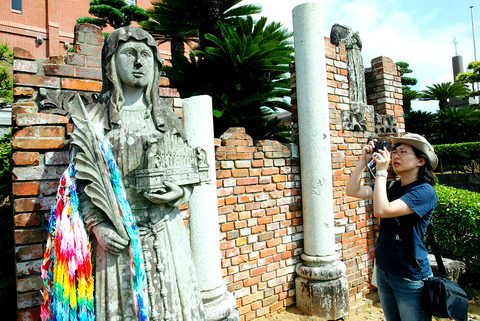On the eve of the anniversary today of Nagasaki's devastation 60 years ago by the "Fat Man" atomic bomb, a steady stream of tourists flowed past the horrific exhibits at the city's memorial museum.
There is a clock, its glass smashed and bent hands frozen at exactly 11:02, the moment of the blast. There are photos, in black and white and in color, of the human toll. Chipped statues from a Catholic cathedral, once the largest in the Orient, line one wall.
But just a short walk away at Ground Zero, where a simple monolith stands in a small, dusty park, Ritsuko Yamasaki, offered a common lament.

PHOTO: EPA
"Our city is always in the shadow of Hiroshima," said Yamasaki, 70, who sells ice cream cones at the blast site. "Look at this. Tourists come here and ask me, `Where is the monument?' Hiroshima's is so much bigger. We need something like that, too."
Nagasaki's commemoration today will be a relatively quiet event.
Unlike Hiroshima, where more than 55,000 people crowded into Peace Memorial Park last week for a solemn memorial, officials here expected about 6,000 people to join in. The ceremony itself is almost the same -- like Hiroshima, a moment of silence will be observed, followed by speeches from the mayor and Prime Minister Junichiro Koizumi.
Yesterday, hundreds of labor union representatives staged a peace march through the city, and small gatherings were held to remember the dead. On each of the several cenotaphs in and around Nagasaki's peace park were draped thousands of colorful paper cranes, which are believed to ease the pain of the dead.
Hojun Kubo, 79, said he comes to Nagasaki from his home in central Japan every year.
"I don't know anyone who died here," he said, after placing a string of cranes on Ground Zero. "But it was my generation that fought the war. Many of my friends died fighting. I come here because of that. It seems people forget about Nagasaki. I don't want that to happen."
Nagasaki's tragedy almost never happened.
Three days after the Enola Gay dropped the "Little Boy" bomb on Hiroshima, killing at least 140,000 in the world's first atomic bomb attack, another bomber, Bock's Car, took off to deliver the second A-bomb.
It wasn't bound for Nagasaki, however.
Bock's Car's primary target was the nearby city of Kokura. But when it arrived, the city was hidden under a thick cover of smoke. The plane circled three times, then changed course for Nagasaki, where it also encountered thick clouds.
With dwindling fuel, the pilot nearly turned around -- but then the clouds broke.
About 80,000 people died in the blast or because of related injuries or diseases in the months after.
"It's just mind-boggling that a single bomb could wipe out this city," tourist Naoto Otake said as he stood before a full-scale model of Fat Man at the museum. The bomb stood 3.25m tall, and weighed 4.08 tonnes.
Other than the many small monuments around town, few signs of the devastation remain.
Today, Nagasaki, which has a population of about 420,000, has instead become a popular tourist destination, known for its Chinatown, one of the largest in Japan, and its vaguely European flair.

BACKLASH: The National Party quit its decades-long partnership with the Liberal Party after their election loss to center-left Labor, which won a historic third term Australia’s National Party has split from its conservative coalition partner of more than 60 years, the Liberal Party, citing policy differences over renewable energy and after a resounding loss at a national election this month. “Its time to have a break,” Nationals leader David Littleproud told reporters yesterday. The split shows the pressure on Australia’s conservative parties after Prime Minister Anthony Albanese’s center-left Labor party won a historic second term in the May 3 election, powered by a voter backlash against US President Donald Trump’s policies. Under the long-standing partnership in state and federal politics, the Liberal and National coalition had shared power

CONTROVERSY: During the performance of Israel’s entrant Yuval Raphael’s song ‘New Day Will Rise,’ loud whistles were heard and two people tried to get on stage Austria’s JJ yesterday won the Eurovision Song Contest, with his operatic song Wasted Love triumphing at the world’s biggest live music television event. After votes from national juries around Europe and viewers from across the continent and beyond, JJ gave Austria its first victory since bearded drag performer Conchita Wurst’s 2014 triumph. After the nail-biting drama as the votes were revealed running into yesterday morning, Austria finished with 436 points, ahead of Israel — whose participation drew protests — on 357 and Estonia on 356. “Thank you to you, Europe, for making my dreams come true,” 24-year-old countertenor JJ, whose

A documentary whose main subject, 25-year-old photojournalist Fatima Hassouna, was killed in an Israeli airstrike in Gaza weeks before it premiered at Cannes stunned viewers into silence at the festival on Thursday. As the cinema lights came back on, filmmaker Sepideh Farsi held up an image of the young Palestinian woman killed with younger siblings on April 16, and encouraged the audience to stand up and clap to pay tribute. “To kill a child, to kill a photographer is unacceptable,” Farsi said. “There are still children to save. It must be done fast,” the exiled Iranian filmmaker added. With Israel

Africa has established the continent’s first space agency to boost Earth observation and data sharing at a time when a more hostile global context is limiting the availability of climate and weather information. The African Space Agency opened its doors last month under the umbrella of the African Union and is headquartered in Cairo. The new organization, which is still being set up and hiring people in key positions, is to coordinate existing national space programs. It aims to improve the continent’s space infrastructure by launching satellites, setting up weather stations and making sure data can be shared across